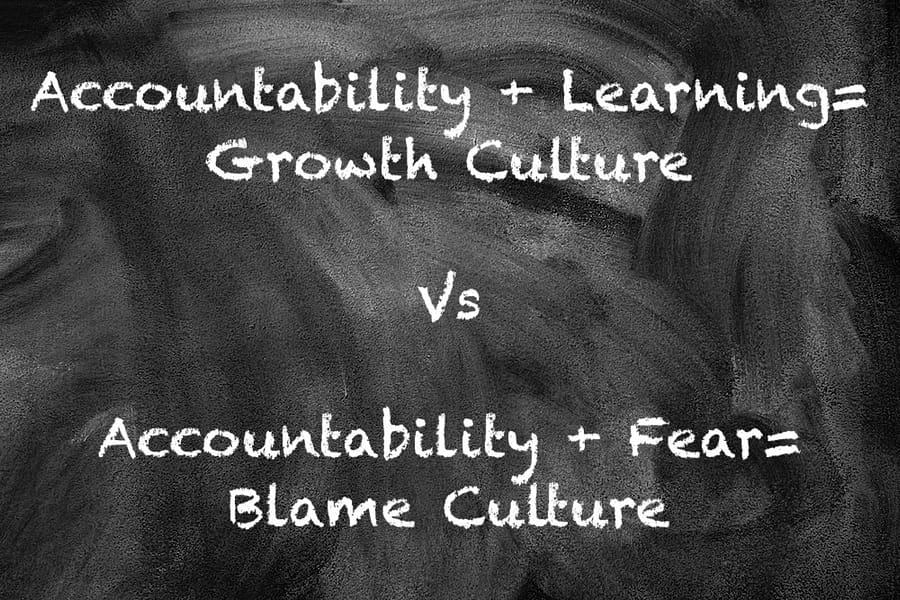We live in a culture where the term ‘accountable’ is erroneously used inter-changeably with blame. If a corporation or politicians should be ‘held to account’ we are invariably saying that they should be blamed and made to answer to perceived mistakes. The perceived decline in leadership accountability and the distrust there is for leaders seems only to reinforce this view. Unfortunately, this pervasive cultural perspective is so ingrained that the word accountability has connotations of blame, consequences of failure and shame attached to it. When applied within organisations it can unhelpfully carry all of this baggage with it and ironically can lead to less self-accountability.
I’ve heard a few leaders in different organisations be concerned about the lack of accountability in their organisation. They have talked about a need to ‘hold people’s feet to the fire’ – not an idiom that I particularly like but it helps to illustrate the issue. Essentially, they are saying that people should feel more pressure and that holding people accountable with consequences would achieve this. The logic being that behaviours would then change to be more beneficial to the functioning of the organisation. Whilst an understandable assumption, I think developing accountability is more of a subtle art. There is a need to first consider what the desired outcome is and what might be the unintended consequences of any actions that might be taken or indeed not taken.
For me accountability when used as a crude instrument has the potential to encourage a culture of fear and blame. I mean, the metaphor used above gives us some good clues as to the potential unintended consequences – if someone was holding your feet to the fire you would pretty much say anything to get out of that situation and try and avoid being in that situation at all costs!! It relies on creating a sense of pressure or fear. Similarly, we see blame cultures create division and conflict as people seek to not be anywhere near the fire and point the finger somewhere else!
There are of course other cascade effects and through fear of blame and the consequences, it leads to people hiding mistakes and issues that could be critical to the organisations learning and success. It can also lead to inaction or risk aversion, micromanagement and employees that only do as instructed. I’ve also seen that in the hope of encouraging accountability there can be an over reliance on metrics to measure performance, and as helpful as metrics can be, how they are applied can have all manner of unintended consequences on organisational behaviour. The whole organisational system can become restricted and rigid and the lack of trust has multiple cascade impacts on the organisations functioning.
“Creating this kind of accountability in an organisation is actually relatively easy to do and not hard to implement….. yet it is incredibly hard to undo!”
The irony is that the pursuit of accountability as described above, ends up creating no true accountability in the organisation- in fact it can create the exact opposite and encourages avoidance and blame. Creating this kind of accountability in an organisation is actually relatively easy to do and not hard to implement….. yet it is incredibly hard to undo! As human beings we are hard wired to look for and remember threats, so even a relatively small number of events that appear to ‘hold people to account’ send a strong and enduring message to teams and organisations. The wider cultural associations and learning through childhood also tend to make people see mistakes or failures as personally attributable and subject to shame and punishment. Misplaced activities to implement increased accountability can just reinforce this and be amplified.
This is not to say that there is not a place for consequences or for pressure. Pressure in the form of challenge is important for growth and learning. The right amount and type of challenge plays an important part in developing learning and resilience throughout our lives. The balance of focus on expectations and aspirations is where the art of accountability sits. Similarly, understanding consequences for actions can be a protective factor in ensuring that values and professional boundaries are adhered to in an organisation. Our legal and social systems rely on rules and where there are rules there are invariably consequences. So potential consequences do have a very important place in the running of organisations, but I would say that how and where consequences are applied is critically important in understanding how they impact on behaviour and culture. An organisations values need to be lived and how consequences are applied and to what, is part of this.
“Focusing on the higher bar and what good looks like can give more attention to growth and learning.”
Our propensity towards negativity bias can mean that we focus on the lowest bar. With our attention on what ‘bad’ looks like or what is not acceptable. Focusing on the higher bar and what good looks like can give more attention to growth and learning. Engaging and involving people in what good looks like also provides important information to the organisation as well as quickly embedding standards that are meaningful, perceived as fair and are aspirational.
Another important component is causality and it is here that the seed of transformative accountability sits. Much is said about the merits of learning cultures and also in how difficult it can be to really implement a learning culture. In part, I think this is due to our negativity bias that seeks out threats and a wider cultural propensity to focus on blame and consequence as if somehow this will enable learning. This is despite that nearly all the evidence suggests otherwise.
The vast majority of problems do not solely arise because of one person- in fact it’s relatively rare. There are often numerous variables at play depending on the nature of the problem. For anyone who has ever seriously studied and applied root cause analysis, it soon becomes clear that these variables range from issues around processes, systems, culture, leadership/management and multiple external factors. Where it apparently seems that an individual is culpable in some way, we sometimes fail to ask what are the other causative factors that we can learn from? Even, when organisations do look at the wider causative factors, the balance of focus is often still on the individual or team, particularly if the wider causative factors raise some uncomfortable questions.
Developing a learning culture enables not just individual growth but importantly organisational growth. It accepts that we all make mistakes and enables people the psychological safety to take accountability and develop. It also enables the organisation to take accountability, focusing on solutions that create enduring change rather than deflecting the blame on to an individual, team or outside agency. The role of leaders and managers in developing a learning culture through practices that encourage accountability is central to success. Leaders and managers should consider their behaviours and how they encourage accountability in the organisation. Some things I have learned by getting it wrong as well as getting it right are below and whilst there is much more I could say, I think they are a good starting point for managers and leaders to consider:
- All challenges are learning opportunities-It can seem like a glib statement and if you want to make it into a reality, it has to be lived. Improvement relies on having a learning mindset. This is communicated in the actions you take and in holding yourself to account when things go wrong.
- Promote Curiosity- Assumptions can lead to a false evaluation and hamper learning. Approach situations from a learning mindset and seek to understand. Ask yourself, what are the assumptions you are making about the situation and accountability? How have you been influenced by your past and how might this be different for others or different in this specific context?
- Stay Calm- emotional responses tend to engender defensiveness and cause a perception of blame (whether intended or not). Remain neutral and open to understanding the issues. I once listened to a CEO talk about how frustrated they would get with someone when something went wrong. On further investigation the frustration stemmed from feeling that the person wasn’t taking personal accountability for issues. Ironically, the CEO’s frustration was interpreted as a threat by the employee and so they avoided perceived blame and didn’t take self-accountability. A vicious and self-perpetuating cycle developed.
- Check your Processes- Processes often have a big part to play when things go wrong. Spend time considering how processes contributed to the issue and what could be done to improve. Even when it appears that it is human error, there is often a wider causal issue at play, be that processes, skills, resources, culture, schemes of delegation etc.
- Good delegation- ensuring that delegation is clear about the objectives and scope of authority, but create the space to support growth and learning. Ensure that the right competences and resources are in place to enable success. Provide opportunities for clarification and feedback.
- Lead by Example- if things go wrong ask yourself what you could have done differently and what have you learned. Where there is a need to take responsibility then knowingly own it.
- Focus on the Issues- Stay focused on the issue before you start to consider human error. Where there is human error try not to personalise it but consider what could have been done differently.
- Enable Others to Learn- After you have considered all the potential issues involved alongside the relevant people, ask questions like: “With hindsight are there things that me or you could have done differently?” or “What have you learned from this?”. The more you encourage a learning culture the more people will readily take accountability and consider what they could have done differently.
The application of accountability is a subtle art. Any template for accountability can only be of partial use, as the context of the organisation and the people who make the organisation, dictates how accountability is brought to life and how it manifests in the activities and behaviours of the organisation. Work is required to understand what is meant by accountability and how it is enacted in a particular organisations psychological and cultural context. Our propensity to be drawn towards a blame culture requires close attention in the development of a learning culture. The balance of understanding how challenge and consequence can sit alongside a learning culture and have protective rather than negative effects is where the nuance or ‘subtle art’ is required. This is not just clarity in where the red lines are but also more importantly how engaged relationships are made and how learning and accountability is enacted through leadership.
I support managers and leaders to have ‘space to think’. If this has been helpful and you need some ‘space to think’ about accountability culture and leadership, then I might be able to help. Contact me for a no obligation chat and let’s see what happens.

